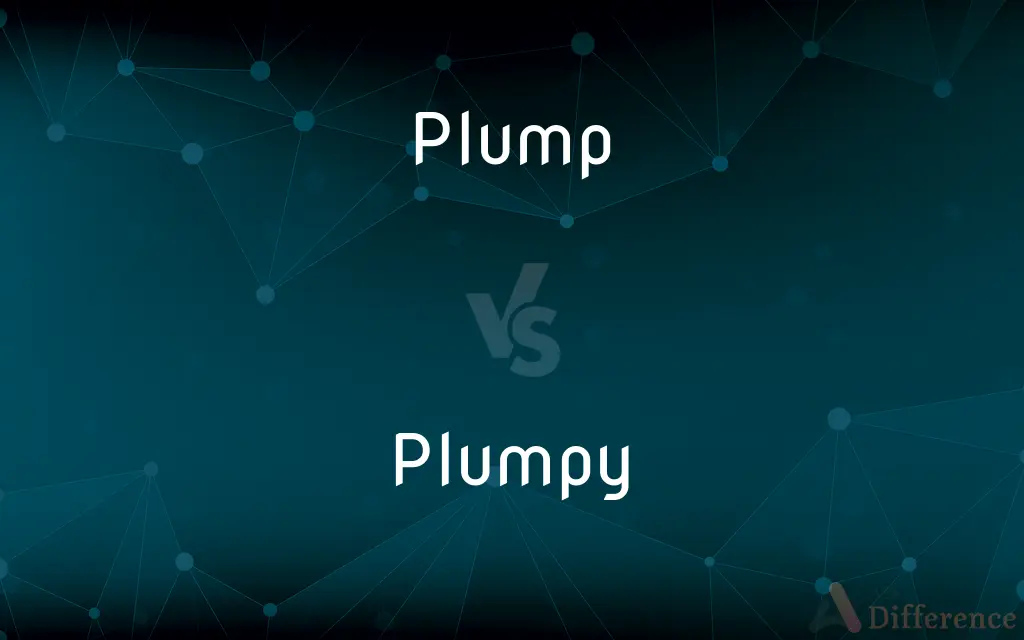Plump vs. Plumpy — What's the Difference?
Edited by Tayyaba Rehman — By Fiza Rafique — Updated on April 3, 2024
Plump is typically used to describe something well-rounded or slightly chubby, suggesting fullness and healthiness. Plumpy, on the other hand, is a less common term and often carries a more endearing or affectionate tone, usually applied to describe a ple

Difference Between Plump and Plumpy
Table of Contents
ADVERTISEMENT
Key Differences
Plump often refers to an object or person that appears full and slightly rounded, suggesting health or a desirable level of fleshiness. This term can apply to various contexts, including describing fruits, animals, or human figures. Whereas plumpy is not as commonly used and tends to convey an affectionate or endearing quality, primarily when describing someone or something with a cute, chubby appearance.
Plump is generally considered a neutral or positive adjective, indicating a healthy or appealing level of roundness, especially in contexts like plump lips or plump fruits. On the other hand, plumpy might be perceived as more informal and possibly even childish, often used in more personal or less formal contexts to describe a similar sense of roundness with an added element of cuteness or charm.
The use of plump can be found across various fields, including food, beauty, and general description, to indicate a certain lushness or fullness. Meanwhile, plumpy is rarely used in professional or technical contexts and is more likely to appear in casual conversation, storytelling, or when describing animals or people in a way that highlights their adorable roundness.
In terms of connotation, plump can range from a straightforward description of physical characteristics to a compliment, especially when used to describe things like juicy fruits or healthy bodies. Plumpy, however, almost always carries a positive, affectionate connotation, emphasizing the subject's appealing, soft roundness rather than just their size.
The term plump is versatile, fitting seamlessly into descriptions of both inanimate objects and living beings without altering its core meaning. Plumpy, however, is more nuanced and often reserved for describing living beings, particularly in a way that accentuates a gentle, cuddly aspect rather than mere size or form.
ADVERTISEMENT
Comparison Chart
Commonality
Common and widely used
Less common, more niche
Connotation
Neutral to positive, indicates health or fullness
Affectionate, endearing, emphasizes cuteness
Contexts
Broad (food, beauty, general description)
Mostly informal, personal or storytelling
Descriptive Focus
Physical fullness or roundness
Cute, chubby appearance with a soft appeal
Usage
Both inanimate objects and living beings
Primarily living beings, especially in a cute context
Compare with Definitions
Plump
Full and rounded in shape.
The plump tomatoes were perfect for the salad.
Plumpy
Exhibiting a cute roundness.
Her plumpy cheeks begged to be pinched.
Plump
Having a full, rounded figure. typically used in a positive context.
She admired her plump cheeks in the mirror.
Plumpy
Conveying an endearing softness or cuddliness.
The plumpy teddy bear was her favorite.
Plump
Sufficiently filled out or expanded.
The plump pillows made the couch look inviting.
Plumpy
Rarely used to describe inanimate objects with a pleasant roundness.
The plumpy design of the vase made it unique.
Plump
(Verb) To become full, rounded, or swollen.
The rains helped the grapes plump up nicely.
Plumpy
(Seldom used) In reference to a person or animal, emphasizing their adorable chubbiness.
The baby’s plumpy legs were covered in rolls.
Plump
Indicating richness or abundance.
He landed a plump job offer right after graduation.
Plumpy
Affectionately chubby or chunky.
The plumpy puppy wobbled as it walked.
Plump
Well-rounded and full in form; chubby.
Plumpy
Plump; fat; sleek.
Plump
Abundant; ample
A plump reward.
Plumpy
(informal) A fat person or thing.
Plump
Blunt; direct.
Plumpy
Plump; fat; sleek.
Plump
To make well-rounded or full in form
Plumped up the pillows.
Plump
To become well-rounded, chubby, or full in form
The baby plumped out at three months.
Plump
To drop abruptly or heavily
Plumped into the easy chair.
Plump
To give full support or praise
Plumped for the candidate throughout the state.
Plump
To throw down or drop (something) abruptly or heavily
Plumped the books onto the table.
Plump
A heavy or abrupt fall or collision.
Plump
The sound of a heavy fall or collision.
Plump
With a heavy or abrupt drop
The anchor fell plump into the sea.
Plump
With a full or sudden impact
Walked plump into the pole.
Plump
Directly
Ran plump into an old friend.
Plump
Without qualification; bluntly
Spoke out plump for the tax bill.
Plump
Having a full and rounded shape; chubby, somewhat overweight.
A plump baby; plump cheeks
Plump
Fat.
Plump
Sudden and without reservation; blunt; direct; downright.
Plump
(intransitive) To grow plump; to swell out.
Her cheeks have plumped.
Plump
(transitive) To make plump; to fill (out) or support; often with up.
To plump oysters or scallops by placing them in fresh or brackish water
Plump
(transitive) To cast or let drop all at once, suddenly and heavily.
To plump a stone into water
Plump
(intransitive) To give a plumper (kind of vote).
Plump
(transitive) To give (a vote), as a plumper.
Plump
To favor or decide in favor of something.
Plump
(intransitive) To drop or fall suddenly or heavily, all at once.
Plump
Directly; suddenly; perpendicularly.
Plump
The sound of a sudden heavy fall.
Plump
(obsolete) A knot or cluster; a group; a crowd.
A plump of trees, fowls, or spears
Plump
A group of geese flying close together.
Plump
Well rounded or filled out; full; fleshy; fat; as, a plump baby; plump cheeks.
The god of wine did his plump clusters bring.
Plump
Done or made plump, or suddenly and without reservation; blunt; unreserved; direct; downright.
After the plump statement that the author was at Erceldoune and spake with Thomas.
Plump
A knot; a cluster; a group; a crowd; a flock; as, a plump of trees, fowls, or spears.
To visit islands and the plumps of men.
Plump
To grow plump; to swell out; as, her cheeks have plumped.
Plump
To drop or fall suddenly or heavily, all at once.
Plump
To give a plumper. See Plumper, 2.
Plump
To make plump; to fill (out) or support; - often with up.
To plump up the hollowness of their history with improbable miracles.
Plump
To cast or let drop all at once, suddenly and heavily; as, to plump a stone into water.
Plump
To give (a vote), as a plumper. See Plumper, 2.
Plump
Directly; suddenly; perpendicularly.
Plump
The sound of a sudden heavy fall
Plump
Drop sharply;
The stock market plummeted
Plump
Set (something or oneself) down with or as if with a noise;
He planked the money on the table
He planked himself into the sofa
Plump
Make fat or plump;
We will plump out that poor starving child
Plump
Give support (to) or make a choice (of) one out of a group or number;
I plumped for the losing candidates
Plump
Euphemisms for slightly fat;
A generation ago...buxom actresses were popular
Chubby babies
Pleasingly plump
Plump
Straight down especially heavily or abruptly;
The anchor fell plump into the sea
We dropped the rock plump into the water
Common Curiosities
Is "plumpy" a real word?
Yes, plumpy is a real word, though less commonly used than plump.
Can "plump" and "plumpy" be used interchangeably?
While they can be used in similar contexts, "plumpy" often carries a more affectionate tone.
Are there any synonyms for plump and plumpy?
Yes, synonyms for plump include chubby, rounded, and full. For plumpy, synonyms might include cuddly or chunky, though few words capture its affectionate connotation.
Can objects be described as plumpy?
It's rare. "Plumpy" is more commonly used for living beings, emphasizing a cute or cuddly aspect.
Can "plump" be used as a verb?
Yes, it can refer to the action of becoming fuller or rounder.
Is "plump" more formal than "plumpy"?
Yes, "plump" is more likely to appear in formal contexts, while "plumpy" is more casual.
Do "plump" and "plumpy" have the same origin?
Both likely stem from words describing fullness or roundness, though "plumpy" may have evolved to express a more affectionate nuance.
Is it offensive to call someone plump or plumpy?
"Plump" is generally neutral or positive, but context matters. "Plumpy" is affectionate and less likely to offend, though personal preferences vary.
How can I use "plump" in a sentence?
"The plump berries were bursting with juice."
How can I use "plumpy" in a sentence?
"She couldn’t resist hugging the plumpy kitten."
Is "plumpy" a recent addition to the English language?
It's not recent but has been less commonly used over time.
Can foods be described as "plumpy"?
Rarely. "Plump" is the preferred term for describing juicy, full fruits or vegetables.
Why might "plumpy" be used less frequently than "plump"?
Its more affectionate, less formal nature makes it less versatile across different types of discourse.
Can "plump" have negative connotations?
In certain contexts, it might, especially if implying excess. However, it's generally seen as positive.
Can "plump" describe textures?
Yes, in contexts like "plump cushions," it suggests a soft, full texture.
Share Your Discovery

Previous Comparison
Restaurant vs. Taqueria
Next Comparison
Rugby vs. FootyAuthor Spotlight
Written by
Fiza RafiqueFiza Rafique is a skilled content writer at AskDifference.com, where she meticulously refines and enhances written pieces. Drawing from her vast editorial expertise, Fiza ensures clarity, accuracy, and precision in every article. Passionate about language, she continually seeks to elevate the quality of content for readers worldwide.
Edited by
Tayyaba RehmanTayyaba Rehman is a distinguished writer, currently serving as a primary contributor to askdifference.com. As a researcher in semantics and etymology, Tayyaba's passion for the complexity of languages and their distinctions has found a perfect home on the platform. Tayyaba delves into the intricacies of language, distinguishing between commonly confused words and phrases, thereby providing clarity for readers worldwide.
















































